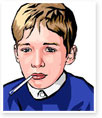|
Definition
A fever (also termed pyrexia) is a higher-than-normal body temperature. It is a symptom caused by a variety of illnesses.
Pyrogens (fever-producing substances) that occur outside the body
- Viruses
- Bacteria
- Fungi
- Drugs
- Toxins
Body temperature measurements:
Body temperature measurements are usually measured by temperature devices inserted on or into the rectum, mouth, axilla (under the armpit), skin, or ear.
Oral temperatures are most commonly measured in adults, but rectal temperatures are the most accurate because environmental factors that increase or decrease temperature measurements have the least effect on the rectal area. Rectal temperatures, when compared to oral temperatures taken at the same time, are about 1.8 F (0.6 C) higher. Consequently, an accurate measurement of body temperature (best is rectal core temperature) of 100.4 F (38 C) or above is considered to be a "fever."
Common causes
Viral fever
Illnesses caused by viruses are among the most frequent causes of fever in adults. Symptoms can include a runny nose, sore throat, cough, hoarseness, and muscle aches. Viruses also may cause diarrhea, vomiting, or an upset stomach.
Bacterial fever
Bacterial illnesses causing fever can affect almost any organ system in the body
Fungal fever
Fungal infections can affect any organ system. Often a physician can identify these infections through a physical examination. Sometimes further testing is required. An anti-fungal medication will usually treat the infection.
Other uncommon causes
- Animal exposure fever
- Travelers' fever Drug fever
- Blood clot fever
- Tumor fever
Special medical conditions
Like weakened immune system
- Cancer
- Cancer treatment medication
- Organ transplant medication
- Steroid therapy for a long time
- HIV
- Age older than 65
- No spleen
- Sarcoidosis
- Lupus
- Malnutrition
- Diabetes
- Heavy alcohol or drug use
Go to doctor for help
A fever has many possible causes. Most commonly, a fever is part of a viral infection that will go away on its own.
Call the doctor if any of these conditions exists.
- If the temperature is 103 F (39.4 C) or greater
- If the fever lasts more than seven days
- If the symptoms get worse
Call the doctor immediately if any of the following symptoms occur with the fever.
- Confusion or excessive sleepiness
- Stiff neck
- Severe headache
- Sore throat
- Rash
- Chest pain
- Trouble breathing
- Repeated vomiting
- Abdominal pain
- Blood in stool
- Pain with urination
Self-Care at Home
You can make the diagnosis of fever by taking your temperature with a thermometer.
In general, a fever can be reduced with ibuprofen (Advil, Motrin, Nuprin) or acetaminophen (Tylenol and others). Both medications help control pain and fever. Alternating doses of each will also work and prevent accidental overdose. At times, a combination of both acetaminophen and ibuprofen will be needed to stop the fever.
Aspirin is not the first choice for fever reduction. It may be toxic in large doses in adults or cause Reye syndrome in children.

Medical Treatment
The treatment of a fever depends on its cause. In most cases, except in hypothermia, acetaminophen or ibuprofen can be given to lower the temperature. Fluids may be given by mouth or IV to prevent dehydration, if necessary.
Prevention
Most fevers come from an infection. You can prevent the spread of infection.
- The best way to prevent the spread of infection is to wash your hands frequently.
- Keep the home and work environment clean.
- Avoid contact with sick people.
- Do not share cups or utensils, especially if they are not clean.
- Wear appropriate protective clothing and equipment when working with animals.
- Make sure your immunizations are current and get the appropriate preventive medication if traveling to another country.
- Do not use illegal drugs.
- During strenuous exercise, stay well hydrated, wear cool clothing, take frequent breaks, and cool down after the workout. Avoid use of alcohol and drugs that can alter behavior and judgment, and don't prevent a person from seeking shelter from the heat.
|